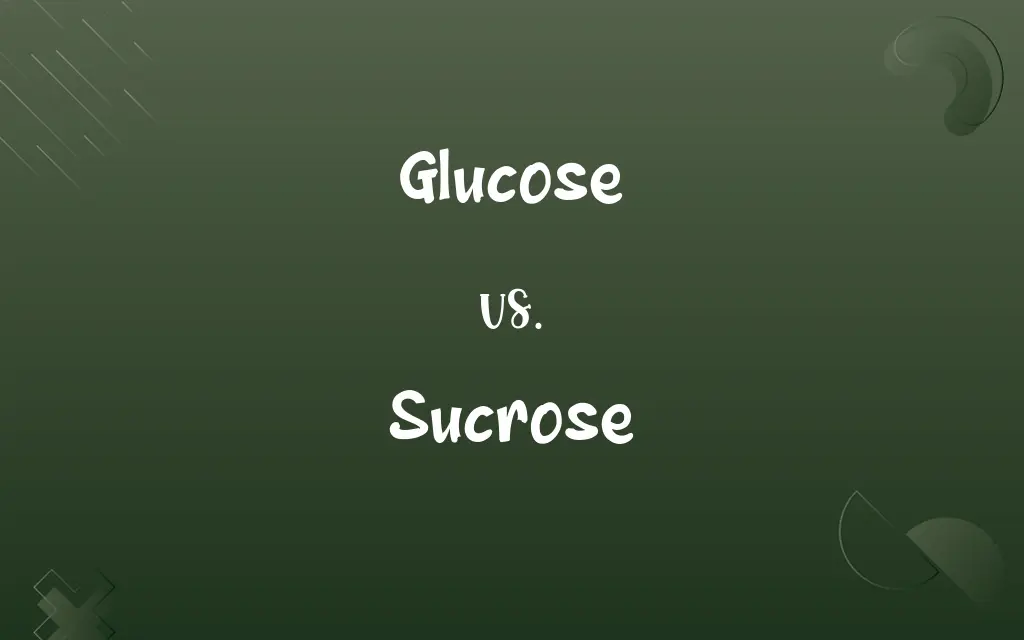Glucose vs. Sucrose: Know the Difference

By Shumaila Saeed || Published on January 13, 2024
Glucose is a simple sugar and a primary source of energy for cells, while sucrose, table sugar, is a disaccharide composed of glucose and fructose.

Key Differences
Glucose is a monosaccharide, the simplest form of carbohydrate. Sucrose is a disaccharide, composed of one glucose and one fructose molecule.
Shumaila Saeed
Jan 13, 2024
Glucose is found in fruits and is a direct energy source for the body. Sucrose, commonly known as table sugar, is found in sugar cane and sugar beets and is used as a sweetener in many foods.
Shumaila Saeed
Jan 13, 2024
Glucose is absorbed directly into the bloodstream and is vital for cellular function. Sucrose is broken down into glucose and fructose before it can be absorbed.
Shumaila Saeed
Jan 13, 2024
Glucose has a direct impact on blood sugar levels, while sucrose first needs to be metabolized into glucose and fructose, impacting blood sugar differently.
Shumaila Saeed
Jan 13, 2024
Glucose is used in food and beverages for energy and sweetness. Sucrose is widely used in the food industry as a sweetener and preservative.
Shumaila Saeed
Jan 13, 2024
ADVERTISEMENT
Comparison Chart
Impact on Health
Essential for cell energy, affects diabetes
Sweet taste, can contribute to tooth decay
Shumaila Saeed
Jan 13, 2024
ADVERTISEMENT
Glucose and Sucrose Definitions
Glucose
A monosaccharide with the formula C6H12O6.
Glucose is often used in sports drinks for quick energy.
Shumaila Saeed
Dec 17, 2023
Sucrose
A sugar that is broken down into glucose and fructose in the body.
When consumed, sucrose is metabolized into two simpler sugars.
Shumaila Saeed
Dec 17, 2023
Glucose
A sweet-tasting soluble carbohydrate.
Glucose is less sweet than fructose but more than galactose.
Shumaila Saeed
Dec 17, 2023
Sucrose
A disaccharide composed of glucose and fructose.
Sucrose is commonly known as table sugar.
Shumaila Saeed
Dec 17, 2023
Glucose
A key molecule in metabolism and photosynthesis.
Plants produce glucose through the process of photosynthesis.
Shumaila Saeed
Dec 17, 2023
ADVERTISEMENT
Sucrose
A natural sweetener derived from sugar cane or sugar beets.
Sucrose is refined to produce white sugar for culinary uses.
Shumaila Saeed
Dec 17, 2023
Glucose
A simple sugar and important energy source in living organisms.
Glucose levels in the blood are closely monitored in diabetic patients.
Shumaila Saeed
Dec 17, 2023
Sucrose
Common sugar used in confectionery and baking.
Sucrose is the main ingredient in making syrups and icing.
Shumaila Saeed
Dec 17, 2023
Glucose
The main form of sugar stored in the body for energy.
After a long run, the body's glucose reserves are depleted.
Shumaila Saeed
Dec 17, 2023
Sucrose
A carbohydrate used in foods for sweetness and energy.
Baked goods often contain sucrose for sweetness.
Shumaila Saeed
Dec 17, 2023
Glucose
A monosaccharide sugar, C6H12O6, that is used by living things to obtain energy through the process of aerobic respiration within cells. It is the principal circulating sugar in the blood of humans and other mammals.
Shumaila Saeed
Dec 13, 2023
Sucrose
A crystalline disaccharide of fructose and glucose, C12H22O11, extracted chiefly from sugarcane and sugar beets and commonly known as table sugar. Also called saccharose.
Shumaila Saeed
Dec 13, 2023
Glucose
A colorless to yellowish syrupy mixture of dextrose, maltose, and dextrins containing about 20 percent water, used in confectionery, alcoholic fermentation, tanning, and treating tobacco. Also called starch syrup.
Shumaila Saeed
Dec 13, 2023
Sucrose
(carbohydrate) A disaccharide with formula C12H22O11, consisting of two simple sugars, glucose and fructose; normal culinary sugar.
Shumaila Saeed
Dec 13, 2023
Glucose
(carbohydrate) A simple monosaccharide (sugar) with a molecular formula of C6H12O6; it is a principle source of energy for cellular metabolism.
Shumaila Saeed
Dec 13, 2023
Sucrose
A common variety of sugar found in the juices of many plants, as the sugar cane, sorghum, sugar maple, beet root, etc. It is extracted as a sweet, white crystalline substance which is valuable as a food product, and, being antiputrescent, is largely used in the preservation of fruit. Called also saccharose, cane sugar, etc. At one time the term was used by extension, for any one of the class of isomeric substances (as lactose, maltose, etc.) of which sucrose proper is the type; however this usage is now archaic.
Shumaila Saeed
Dec 13, 2023
Glucose
A variety of sugar occurring in nature very abundantly, as in ripe grapes, and in honey, and produced in great quantities from starch, etc., by the action of heat and acids. It is only about half as sweet as cane sugar. Called also dextrose, grape sugar, diabetic sugar, and starch sugar. See Dextrose.
Shumaila Saeed
Dec 13, 2023
Sucrose
A complex carbohydrate found in many plants and used as a sweetening agent
Shumaila Saeed
Dec 13, 2023
Glucose
Any one of a large class of sugars, isometric with glucose proper, and including levulose, galactose, etc.
Shumaila Saeed
Dec 13, 2023
Glucose
The trade name of a sirup, obtained as an uncrystallizable reside in the manufacture of glucose proper, and containing, in addition to some dextrose or glucose, also maltose, dextrin, etc. It is used as a cheap adulterant of sirups, beers, etc.
Shumaila Saeed
Dec 13, 2023
Glucose
A monosaccharide sugar that has several forms; an important source of physiological energy
Shumaila Saeed
Dec 13, 2023
Repeatedly Asked Queries
How is glucose absorbed in the body?
Glucose is absorbed directly into the bloodstream from the digestive tract.
Shumaila Saeed
Jan 13, 2024
Where is sucrose commonly found?
Sucrose is commonly found in sugar cane, sugar beets, and as a sweetener in many foods.
Shumaila Saeed
Jan 13, 2024
Is glucose a natural sugar?
Yes, glucose is a natural sugar found in fruits and honey.
Shumaila Saeed
Jan 13, 2024
What is hypoglycemia?
Hypoglycemia is a condition characterized by abnormally low blood glucose levels, which can cause symptoms like dizziness and confusion.
Shumaila Saeed
Jan 13, 2024
Can glucose be used as an intravenous (IV) treatment?
Yes, glucose solutions are commonly used in medical settings to treat dehydration and increase blood sugar levels.
Shumaila Saeed
Jan 13, 2024
What is glucose primarily used for in the body?
Glucose is primarily used as an essential source of energy for cells.
Shumaila Saeed
Jan 13, 2024
Can glucose be stored in the body?
Yes, glucose can be stored in the liver and muscles as glycogen.
Shumaila Saeed
Jan 13, 2024
What makes up sucrose?
Sucrose is made up of one glucose and one fructose molecule.
Shumaila Saeed
Jan 13, 2024
Is glucose the same as fructose?
No, glucose and fructose are different sugars with distinct chemical structures and properties.
Shumaila Saeed
Jan 13, 2024
How does sucrose taste?
Sucrose has a sweet taste, which is why it's commonly used as a sweetener.
Shumaila Saeed
Jan 13, 2024
Is sucrose the same as high fructose corn syrup (HFCS)?
No, sucrose is different from HFCS, which is a syrup containing varying proportions of glucose and fructose.
Shumaila Saeed
Jan 13, 2024
Can sucrose be broken down into its constituent sugars in the body?
Yes, enzymes in the digestive system break down sucrose into glucose and fructose for absorption.
Shumaila Saeed
Jan 13, 2024
Can sucrose be used in baking and cooking?
Yes, sucrose is a common ingredient in baking and cooking to add sweetness and texture to various dishes.
Shumaila Saeed
Jan 13, 2024
How does the body use sucrose?
The body breaks down sucrose into glucose and fructose, which are then used for energy.
Shumaila Saeed
Jan 13, 2024
What is the normal blood glucose level?
The normal blood glucose level for fasting adults is typically around 70-100 mg/dL.
Shumaila Saeed
Jan 13, 2024
Is sucrose found in natural fruits and vegetables?
Yes, sucrose occurs naturally in many fruits and vegetables, contributing to their sweetness.
Shumaila Saeed
Jan 13, 2024
Is glucose the same as blood sugar?
Yes, glucose is often referred to as blood sugar because it circulates in the bloodstream and regulates blood sugar levels.
Shumaila Saeed
Jan 13, 2024
What are the potential health risks of consuming too much sucrose?
Excessive sucrose consumption is linked to obesity, dental cavities, and other health problems.
Shumaila Saeed
Jan 13, 2024
Share this page
Link for your blog / website
HTML
Link to share via messenger
About Author
Written by
Shumaila SaeedShumaila Saeed, an expert content creator with 6 years of experience, specializes in distilling complex topics into easily digestible comparisons, shining a light on the nuances that both inform and educate readers with clarity and accuracy.









































































